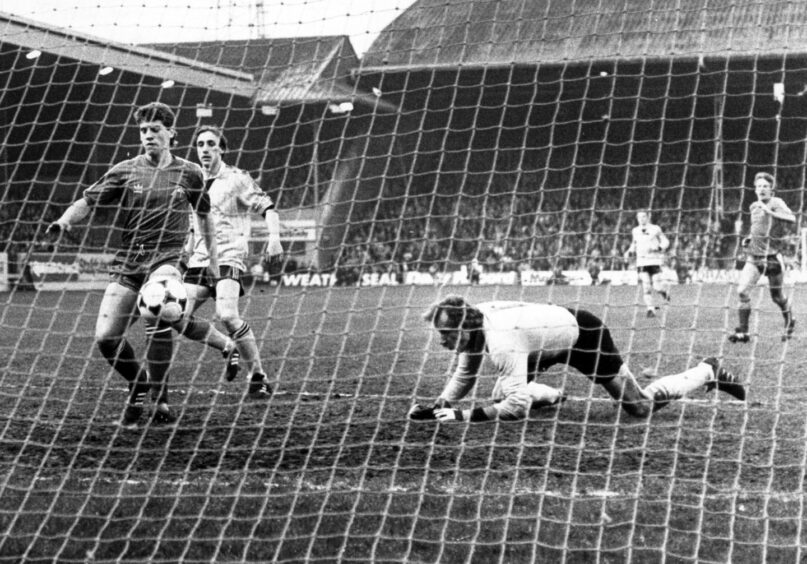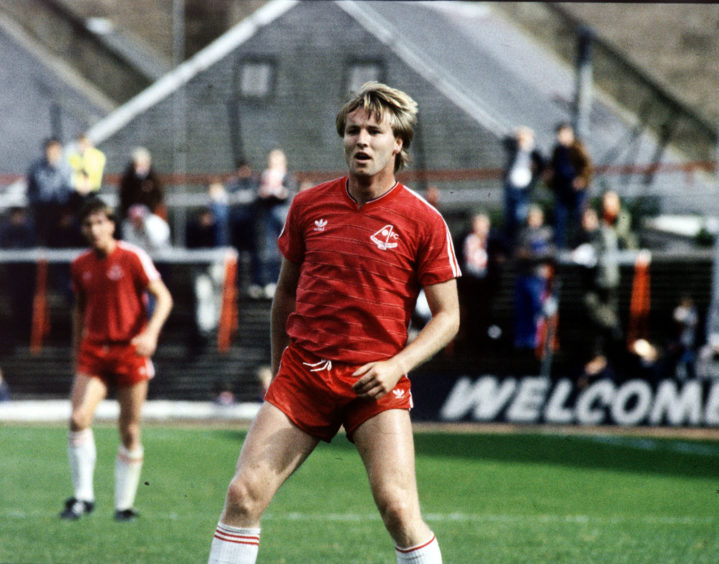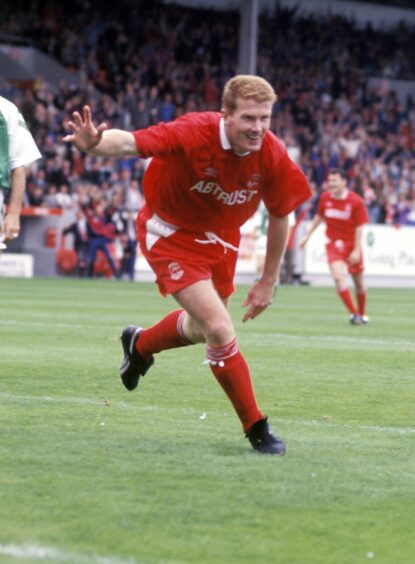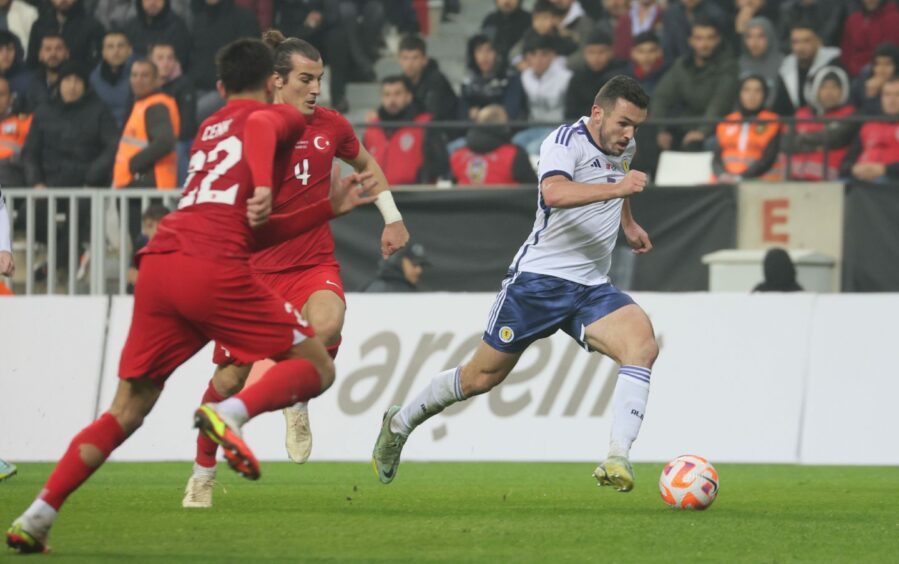Dougie Bell was a footballer capable of taking on the opposition on his own – and I’m so pleased my former Aberdeen team-mate will be inducted into the club’s hall of fame later in the week.
Dougie is one of the Dons legends who will be recognised during this year’s ceremony, which will take place at the Chester Hotel on Wednesday evening.
I’m delighted I’ll have the chance to be there for what I’m sure will be a special moment for him.
But Dougie was a special type of player, which Aberdeen fans know from his six-year spell during the club’s golden period.
He is a quiet guy, but was always determined with a mind of his own.
Dougie was certainly gifted athletically, and even now looks like he could still be playing.
However, his greatest asset as a player was the ability to keep the ball using his excellent close control.
Paired with his balance and powerful running, it made him virtually impossible for defenders to pin down.
He was so good at it, at times you felt as though he didn’t need team-mates.
You knew, if you gave the ball to him in a match where we were expected to take the game to the opposition, he had the capability to take it, beat a couple of players and make something happen.
His dribbling ability was something you could not help be impressed by as a Dons fan or team-mate (although I’m sure it was terrifying for our opponents) and he was quite unique in his style at the time – a style which was totally different from other midfielders like Neil Simpson and Neale Cooper.
Dougie’s finesse round the sides gave us a different option.
He was like our secret weapon to make the opposition suffer in those types of matches.
Like most, the game which stands out for me as his absolute greatest moment in red was the Waterschei home game in the semi-finals of our run to the European Cup Winners’ Cup in 1983. It was a match we won 5-1.
I don’t think the Belgians had ever seen a player like Dougie – one who was so direct, with the close control and who could take opposition players on – and they were powerless to stop him setting up Eric Black for the opener, among other moments that night.
I’m not sure why it has taken until now for him to be inducted into the hall of fame, because, although he missed the Cup Winners’ Cup final in Gothenburg due to a broken leg, he was an important part of our success under Sir Alex Ferguson, with Dougie winning three league titles, two Scottish Cups and the Super Cup during his time at Pittodrie,
Squads in those days were tighter, and Dougie’s contributions, like every other player’s, were vital in all of the trophies we won during the early to mid-1980s.
McDougall was magnificent
I will also be accepting the hall of fame accolade for another of my former team-mates, Frank McDougall, on Wednesday.
He isn’t very well at the moment, so won’t be in attendance, and I wish him all the best.
Frank was a magnificent striker.
We’re in a modern age where strikers are criticised for not doing x, y and z in addition to scoring goals.
But the most important task – putting the ball in the net from inside the penalty box – was something Frank was phenomenal at.
His tallies for his two seasons with the Dons – and four goals against Celtic at Pittodrie in season 1985/86 – don’t lie.
And who knows what he could have achieved had a back injury not robbed him of the later years of his career.
I remember watching him as I sat injured in the stand during the 3-0 win at Tynecastle to clinch the league title in 1985.
He scored a hat-trick on the day, and every single chance he had, you knew he was going to bury it.
He just had the knack of making the right run, finding the space and the finish.
Frank had the instinct, calmness and ability required in bucket-loads – and was just a striker of the highest order.
Dunc was deadly for me and is also deserving of hall of fame honour
Duncan Shearer is another former Aberdeen player set to be honoured on Wednesday.
I signed Duncan when I was manager at the club between 1992 and 1995.
I first saw Duncan play for Swindon Town, where he had a terrific four-year spell to 1992 – although I’d actually travelled down to watch Scotland centre-half Colin Calderwood.
Duncan impressed me, although he opted to move to Blackburn Rovers under Kenny Dalglish at that time.
When I eventually got him up to Pittodrie, he was flying, and scored 27 and 26 goals in his two full seasons for me.
The first year, 1992/93 – my first as a manager – was exciting, with Shearer’s goals complemented by the equally prodigious Mixu Paatelainen as we reached two cup finals and finished second.
Duncan played a big part and for me was another totally natural goalscorer.
I didn’t sign him to chase central defenders, go out to close down full-backs or to do work going back down the park, as modern managers might.
I signed him to be in and around the penalty box. It’s where he thrived – and it worked a treat.
When I say “around the box”, by the way, I mean around – it wasn’t just goals from close-in Duncan scored. He had a thunderous shot on him and could have a go, and score, from 25 and 30 yards, with no problem at all.
Can John McGinn break Scotland scoring record?
John McGinn is now Scotland’s main man – and showed his importance to the national team once again in last week’s 2-1 friendly defeat over in Turkey.
McGinn has been in and out of the side at Aston Villa this season, but he’s the go-to player for Steve Clarke’s Dark Blues.
Clarke certainly needed McGinn’s latest moment of magic to pull Scotland back into things at 2-0 down on Wednesday, because they were putting in a horrendous performance against what looked a good Turkey side in a testing environment.
The former St Mirren and Hibs player took the game by the scruff of the neck with his electric run and left-foot drive into the far corner.
If Messi had scored that goal, it would have been everywhere.
It was a demonstration of the influence an individual can have on the collective in a football match, as it inspired the rest of the team and changed the direction of the game, giving the Scots the momentum – even belief – which allowed them to start dictating things and pushing for an equaliser in the latter stages.
Although they didn’t get the second goal, it meant it was a far less demoralising evening when all was said and done.
McGinn is cult hero for fans, and now has 15 goals from the midfield area for the national team – halfway to the 30-goal all-time mark jointly-held by Kenny Dalglish and Aberdonian icon Denis Law.
Given he’s still got years ahead of him, I wouldn’t bet against him beating their tallies.





Conversation